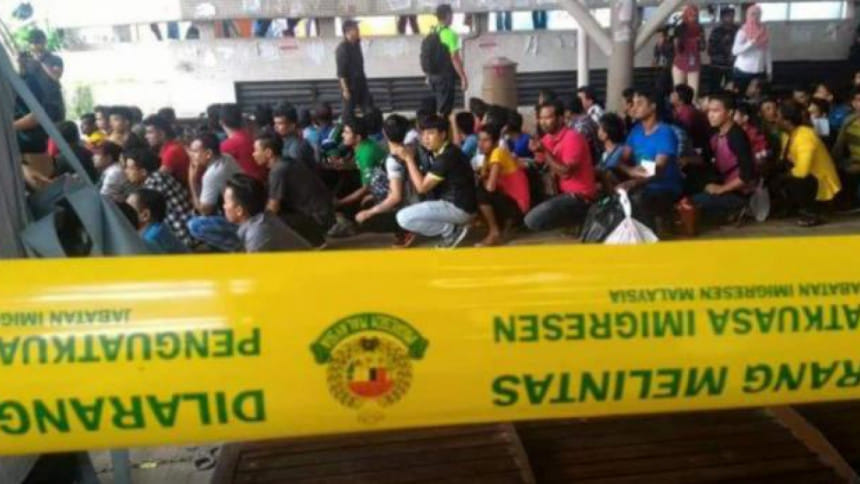Malaysian Bar against crackdown on illegal migrants

Malaysian Bar has urged its government to immediately cease the ongoing crackdown on undocumented migrants and embark on a comprehensive legalisation programme allowing them to independently apply for regularisation.
During the rehiring programme started on February 15, 2016, three private companies were contracted by the government for registering the migrants for regularisation.
However, a lot of brokers were involved in it and they took advantage of the migrants' vulnerability to defraud them, it said.
"This crackdown instills fear among migrant workers and deters them all, even those with proper documents, from coming out to work. This has wide ramifications for the productivity of major economic sectors such as agriculture and construction," said Malaysian Bar in a statement yesterday.
In the statement, George Varughese, president of Malaysian Bar, said migrant workers are needed for the economic development of the country, and that this crackdown in its present form benefits no one.
Malaysia's immigration department began the nationwide operation dubbed "Ops Mega 3.0" on July 1, a day after it ended a rehiring programme on June 30.
The new Malaysian government, which came to power early May, announced it wanted to reduce dependence on foreign workers in Malaysia, home to some six million foreign workers.
There are nearly one million Bangladeshi migrants, and some 50 percent of them are either in the process of regularisation or were defrauded by the agents and brokers, said migrants and rights activists.
On July, Immigration Department detained a Bangladesh national and seized 85 passports as well as cash in a raid in Kuala Lumpur where he operated to rehire undocumented foreign workers illegally.
Around 1300 migrants, including some 300 Bangladeshis were detained in the last five days, Malaysian media reported.
The Malaysian Bar said a significant number of migrants are undocumented for no fault of their own but because Malaysian government provided no avenue for them to independently legalise their status.
"The process of renewing their work permits, of legalising their work status, and of getting rehired by their employer, had to and could only be done by employers via selected private companies, which were appointed by the government," said George Varughese.
Further, the criteria set in the legalisation programme were impractically restrictive, excluding a large number of migrant workers, who do not possess a valid record of entry or who left their original employers were not allowed to be legalised under the rehiring programme, he said.
The lack of labour inspection by the authorities left migrant workers, who faced rights violations, unable to seek redress and left them with little option but to "run away" from their employer to seek employment elsewhere.
"When the system does not address labour violations, it is unfair to penalise migrant workers for protecting themselves," Varughese said.
Further, the sudden swell of persons detained in the already overcrowded detention centres jeopardizes the health of all detainees and the enforcement officials working in these detention centres, he observed.
The government of Malaysia must fulfill its obligation under the ASEAN Consensus on the Protection and Promotion of the Rights of Migrant Workers as Malaysia is committed to provide a comprehensive amnesty programme for all undocumented migrants, the statement said.

 For all latest news, follow The Daily Star's Google News channel.
For all latest news, follow The Daily Star's Google News channel. 








Comments